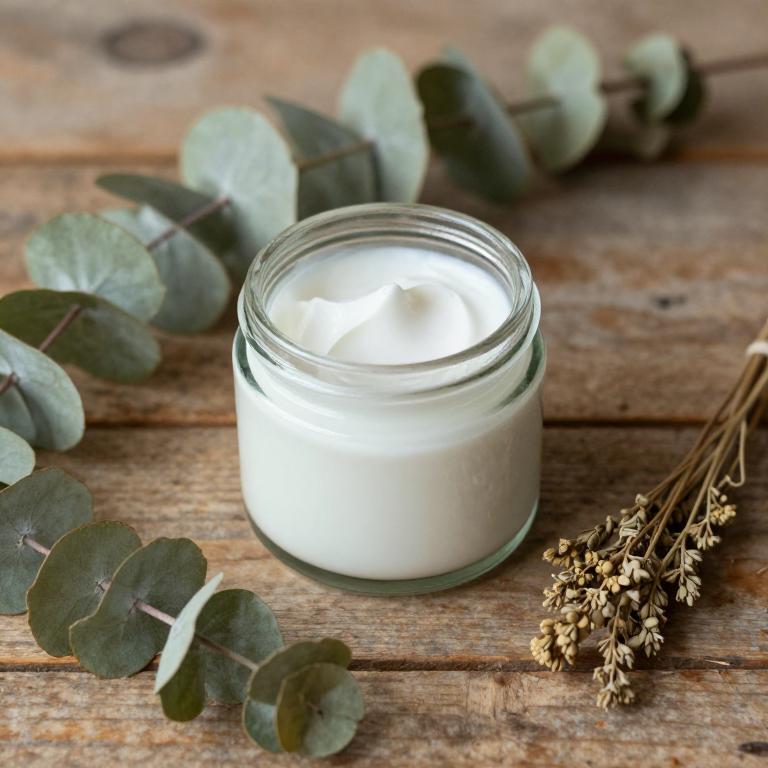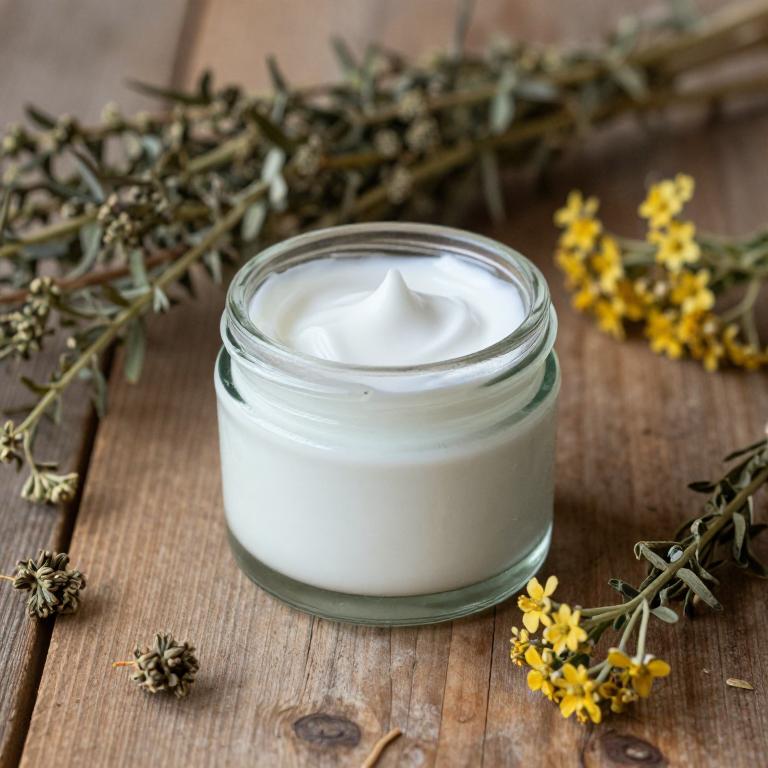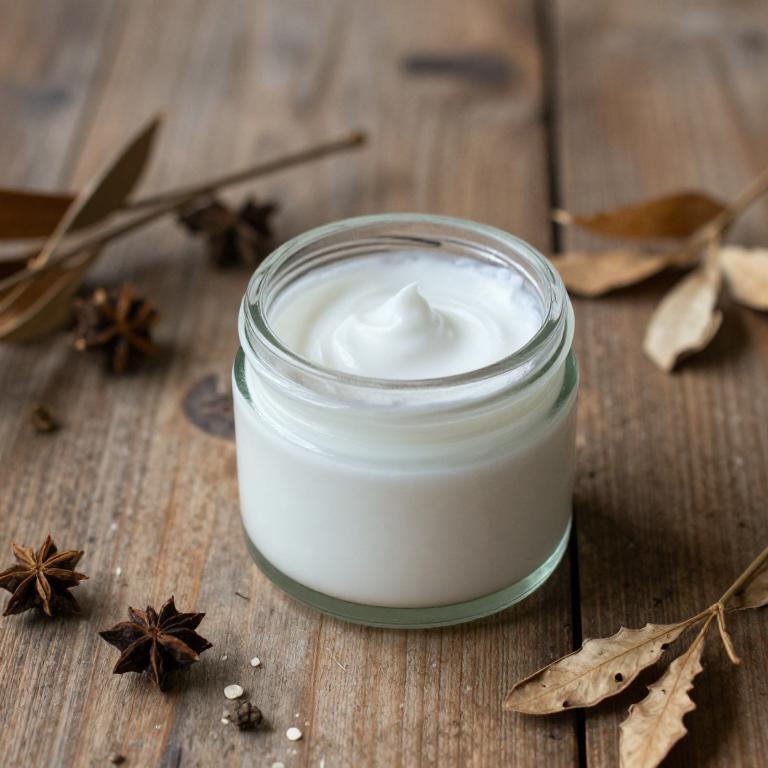10 Best Herbal Creams For Throat Congestion

Herbal creams for throat congestion are natural topical treatments that aim to alleviate symptoms such as soreness, inflammation, and irritation in the throat.
These creams often contain ingredients like eucalyptus, menthol, chamomile, and peppermint, which are known for their soothing and anti-inflammatory properties. They work by providing a cooling or warming sensation that can help reduce discomfort and ease breathing. While they are generally safe for most people, individuals with sensitive skin should perform a patch test before use.
These creams are particularly useful for those seeking alternative or complementary remedies to traditional over-the-counter medications.
Table of Contents
- 1. Eucalyptus (Eucalyptus globulus)
- 2. Peppermint (Mentha piperita)
- 3. Ginger (Zingiber officinale)
- 4. Thyme (Thymus vulgaris)
- 5. Salvia (Salvia officinalis)
- 6. Rosemary (Rosmarinus officinalis)
- 7. Ceylon cinnamon (Cinnamomum zeylanicum)
- 8. Black pepper (Piper nigrum)
- 9. Licorice (Glycyrrhiza glabra)
- 10. Yarrow (Achillea millefolium)
1. Eucalyptus (Eucalyptus globulus)

Eucalyptus globulus, commonly known as eucalyptus oil, is often incorporated into herbal creams to provide relief from throat congestion due to its soothing and anti-inflammatory properties.
These creams typically combine eucalyptus oil with other natural ingredients like menthol, camphor, or honey to enhance their effectiveness in easing soreness and reducing mucus buildup. When applied topically to the throat or chest, the warming sensation from the ingredients can help open up airways and promote easier breathing. Herbal creams containing eucalyptus globulus are a popular alternative for those seeking natural remedies for respiratory discomfort.
However, it is important to consult a healthcare professional before use, especially for children or individuals with sensitive skin.
2. Peppermint (Mentha piperita)

Mentha piperita, commonly known as peppermint, is often incorporated into herbal creams designed to alleviate throat congestion due to its soothing and decongestant properties.
These creams typically combine peppermint oil with other natural ingredients like eucalyptus or menthol to create a cooling effect that helps reduce inflammation and ease breathing. The menthol in peppermint works by stimulating the trigeminal nerve, which can provide a refreshing sensation and help open up the airways. When applied topically to the throat or chest, these creams can offer relief from symptoms such as soreness and tightness without the need for systemic medications.
However, it is important to use them as part of a broader approach to respiratory health, including hydration and rest.
3. Ginger (Zingiber officinale)

Zingiber officinale, commonly known as ginger, has been traditionally used for its anti-inflammatory and decongestant properties, making it a popular ingredient in herbal creams for throat congestion.
These creams often contain ginger extract, which can help reduce inflammation and soothe irritated throat tissues. The warming effect of ginger may also help alleviate the sensation of tightness and discomfort in the throat. When applied topically, these creams can provide localized relief without the need for oral medications.
However, individuals with sensitive skin should perform a patch test before use to avoid potential allergic reactions.
4. Thyme (Thymus vulgaris)

Thymus vulgaris, commonly known as thyme, is often used in herbal remedies for its potent antimicrobial and anti-inflammatory properties.
Thyme-based creams are formulated to provide relief from throat congestion by soothing irritated tissues and reducing inflammation. These creams typically contain essential oils extracted from thyme leaves, which have been shown to help alleviate symptoms of sore throats and respiratory infections. When applied topically, they can offer a cooling and numbing effect, making them a popular choice for natural throat care.
However, it is important to consult a healthcare professional before using thyme creams, especially for individuals with sensitive skin or allergies.
5. Salvia (Salvia officinalis)

Salvia officinalis, commonly known as sage, is a traditional herb often used in the formulation of herbal creams for throat congestion due to its anti-inflammatory and antimicrobial properties.
These creams typically combine sage extract with other soothing ingredients like menthol or eucalyptus to provide relief from soreness and irritation. The natural compounds in sage, such as thujone and flavonoids, help reduce swelling and ease breathing by clearing mucus buildup in the throat. When applied topically, these creams can offer a cooling sensation that comforts the throat and reduces discomfort.
While not a substitute for medical treatment, salvia officinalis herbal creams can serve as a complementary remedy for mild throat congestion and inflammation.
6. Rosemary (Rosmarinus officinalis)

Rosmarinus officinalis, commonly known as rosemary, is often used in herbal creams to alleviate throat congestion due to its anti-inflammatory and decongestant properties.
These creams typically contain essential oils extracted from rosemary leaves, which help to reduce swelling and ease breathing by promoting mucus drainage. The aromatic compounds in rosemary also have a soothing effect, providing relief from irritation and discomfort in the throat. When applied topically, these creams can offer a natural alternative to conventional treatments for minor throat inflammation and congestion.
However, it is important to consult a healthcare professional before using rosemary-based products, especially for individuals with sensitive skin or underlying health conditions.
7. Ceylon cinnamon (Cinnamomum zeylanicum)

Cinnamomum zeylanicum, commonly known as cinnamon, is often used in herbal creams to alleviate throat congestion due to its warming and anti-inflammatory properties.
These creams typically contain essential oils derived from the bark of the cinnamon tree, which can help soothe irritated throat tissues and reduce mucus buildup. The aromatic compounds in cinnamon have been traditionally used to ease respiratory discomfort and promote clear breathing. When applied topically, these creams can provide localized relief from soreness and inflammation associated with colds or infections.
However, it is important to consult a healthcare professional before using cinnamon-based products, especially for individuals with sensitive skin or existing medical conditions.
8. Black pepper (Piper nigrum)

Piper nigrum, commonly known as black pepper, is often used in herbal remedies for its warming and expectorant properties.
When incorporated into throat congestion relief creams, it helps to stimulate mucus flow and ease breathing by promoting local circulation. These creams typically combine black pepper extract with other soothing herbs like eucalyptus or ginger to enhance their effectiveness. The active compounds in black pepper, such as piperine, may help reduce inflammation and soothe irritated throat tissues.
While generally safe for external use, individuals with sensitive skin should perform a patch test before applying these herbal creams.
9. Licorice (Glycyrrhiza glabra)

Glycyrrhiza glabra, commonly known as licorice root, is often used in herbal creams to alleviate throat congestion due to its anti-inflammatory and expectorant properties.
These creams typically contain extracts of licorice root, which can help reduce swelling and irritation in the throat, making breathing easier. The soothing effects of licorice root may also help relieve coughing and ease the discomfort associated with colds or sore throats. However, it is important to use these creams as part of a broader treatment plan and consult a healthcare provider, especially for chronic or severe throat issues.
While generally safe for short-term use, prolonged application of licorice-based products may lead to side effects such as increased blood pressure.
10. Yarrow (Achillea millefolium)

Achillea millefolium, commonly known as yarrow, has been traditionally used in herbal medicine for its anti-inflammatory and antiseptic properties.
When incorporated into herbal creams, it may help alleviate throat congestion by reducing inflammation and soothing irritated tissues. These creams often combine yarrow with other herbs like eucalyptus or chamomile to enhance their soothing effects. However, it is important to consult a healthcare professional before using such creams, especially for persistent or severe throat conditions.
While some people find relief from yarrow-based products, scientific evidence supporting their efficacy for throat congestion remains limited.